2015年《广东中考必备·英语》复习课件 名词
文档属性
| 名称 | 2015年《广东中考必备·英语》复习课件 名词 | 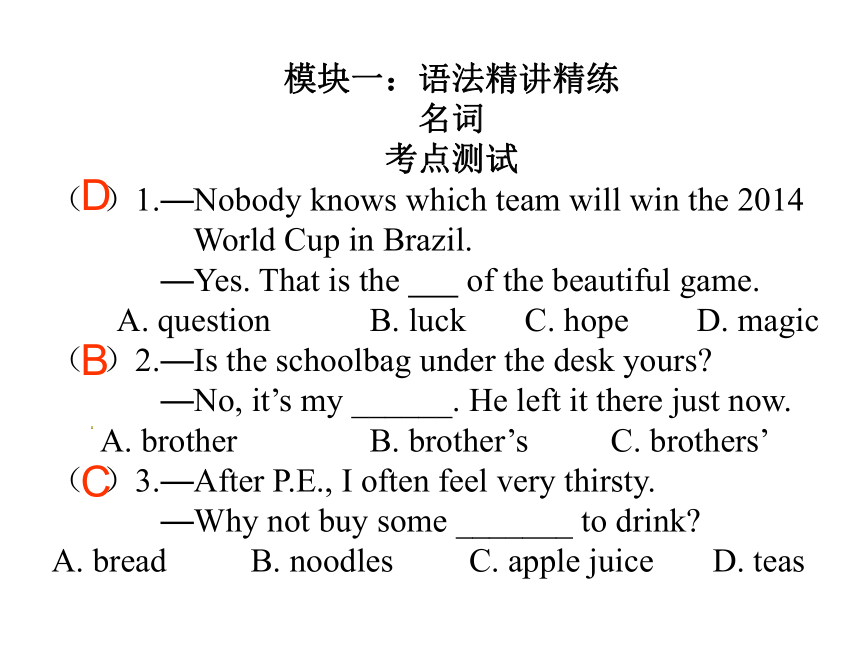 | |
| 格式 | zip | ||
| 文件大小 | 84.1KB | ||
| 资源类型 | 教案 | ||
| 版本资源 | 通用版 | ||
| 科目 | 英语 | ||
| 更新时间 | 2015-04-11 22:51:29 | ||
图片预览

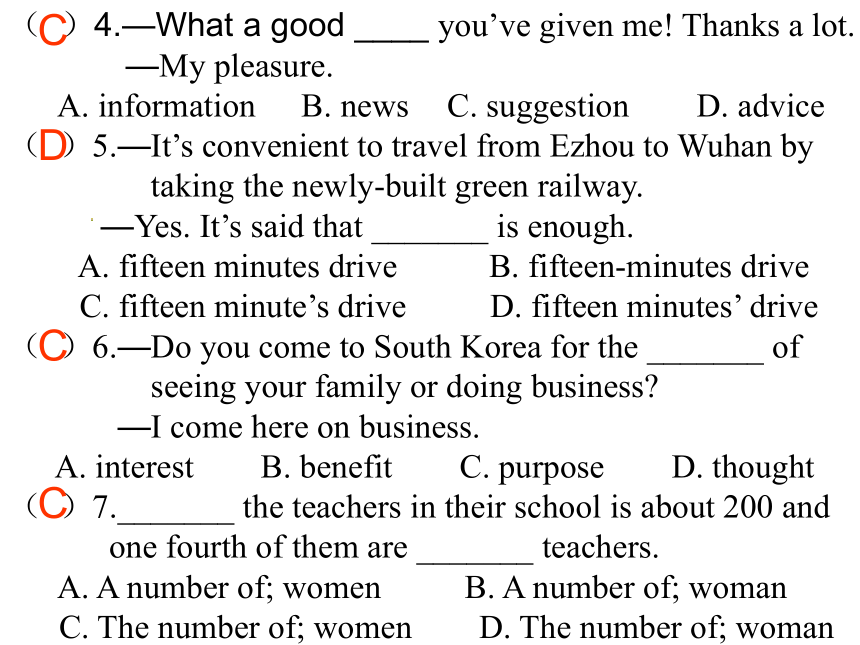
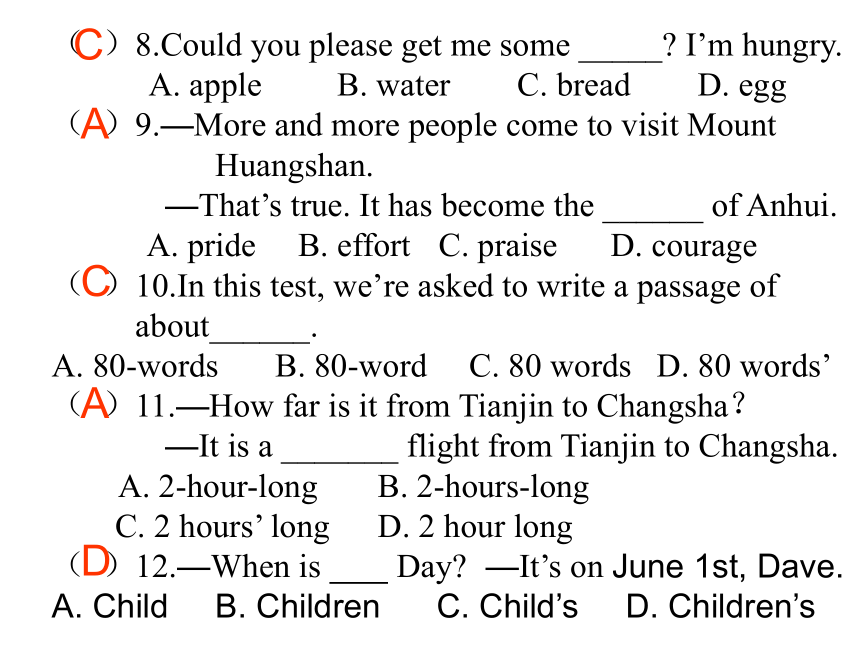
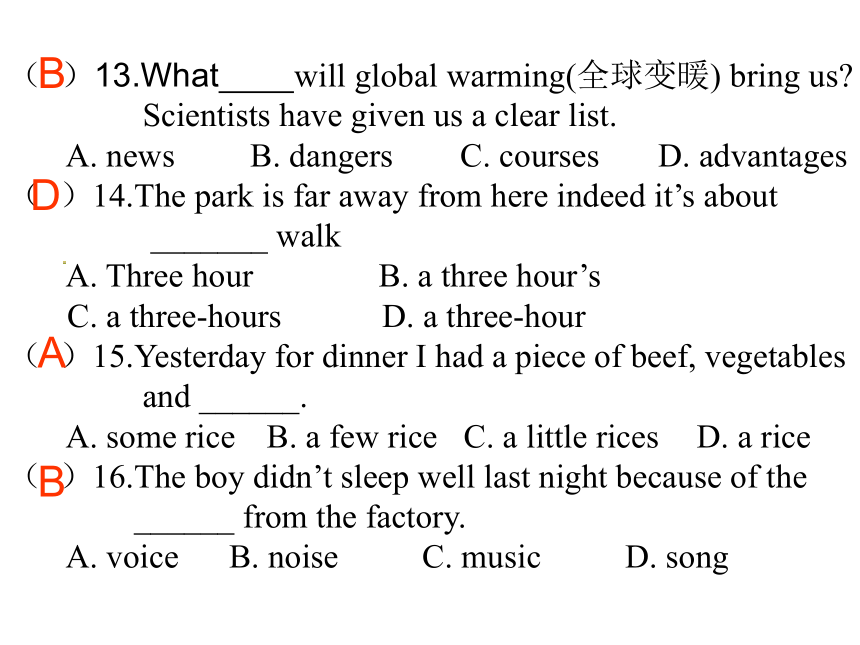
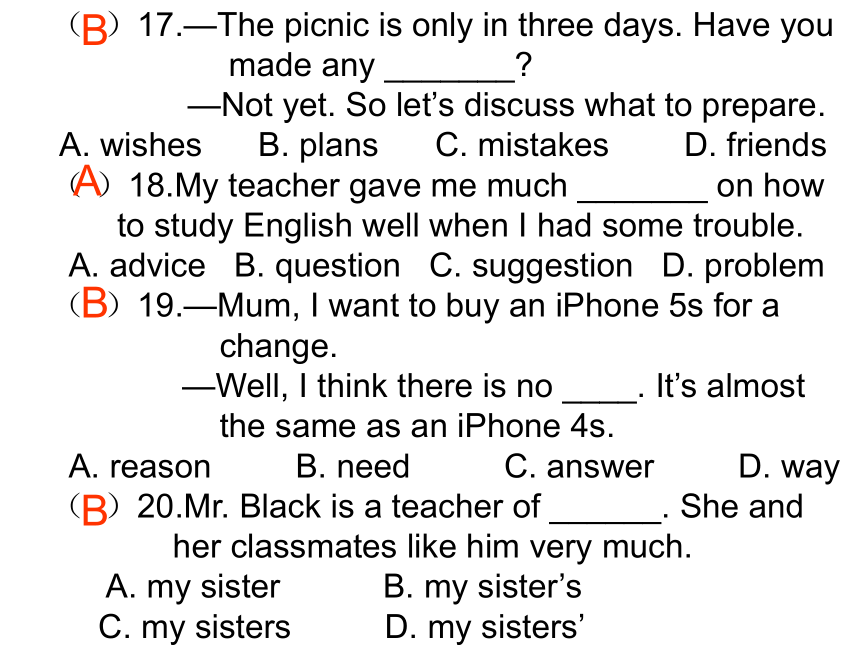
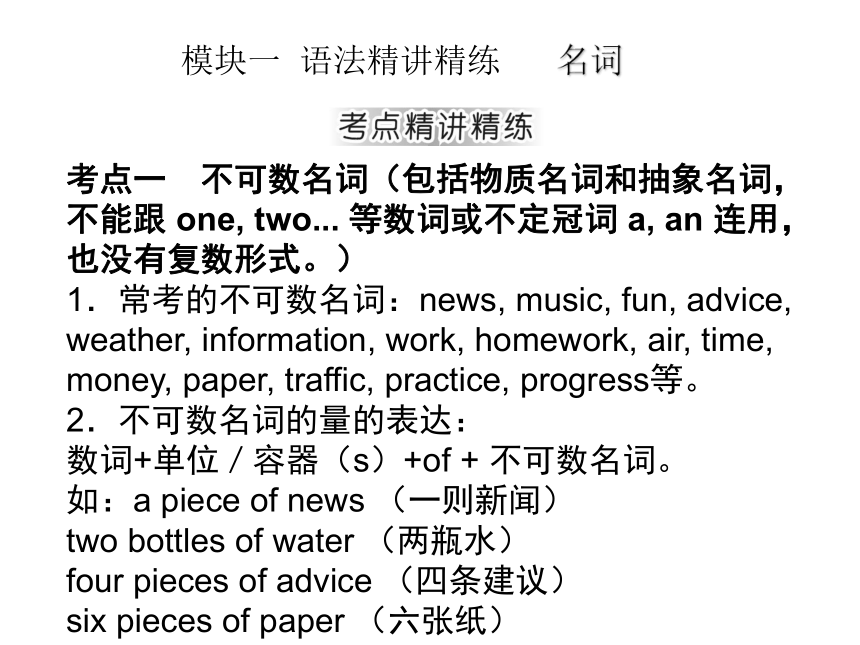
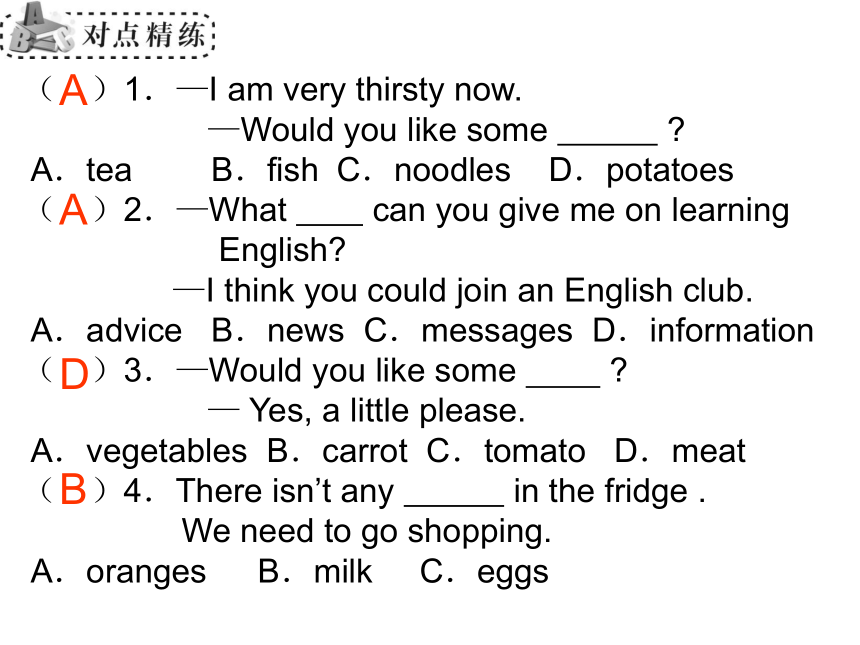
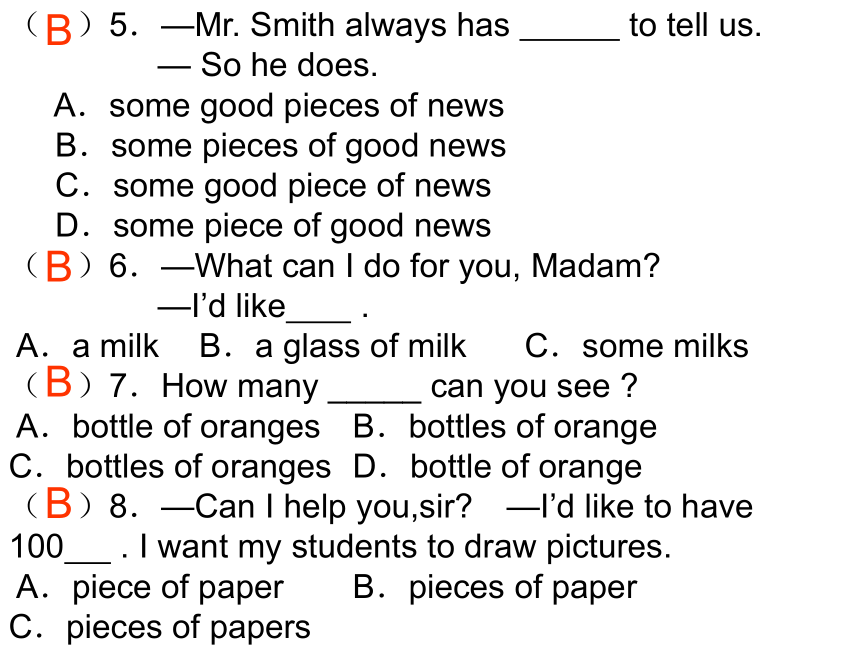
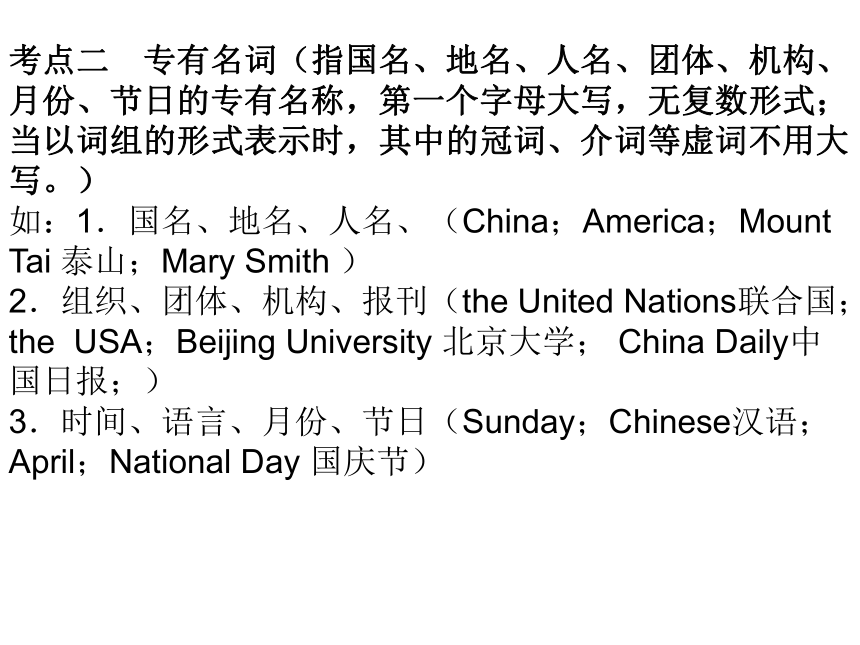
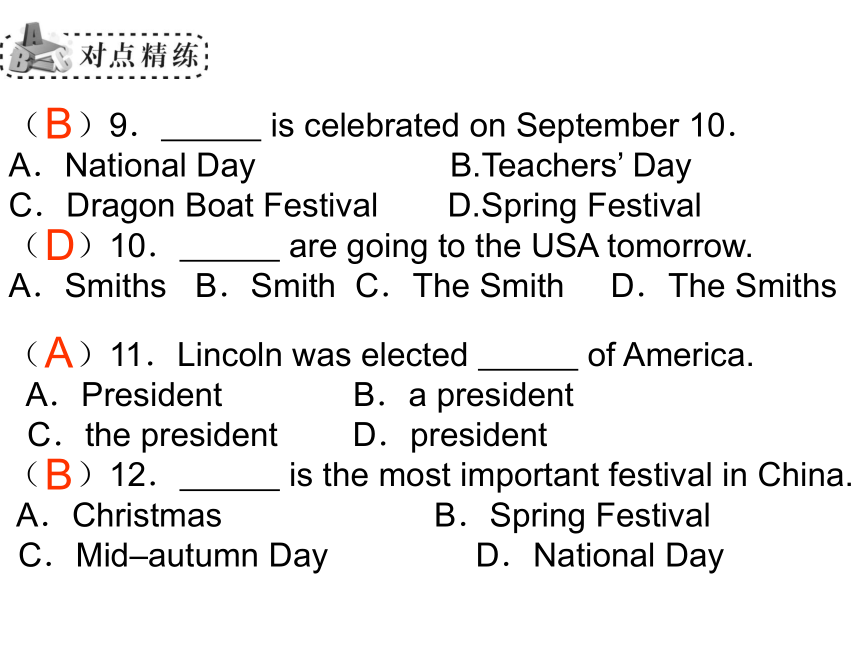
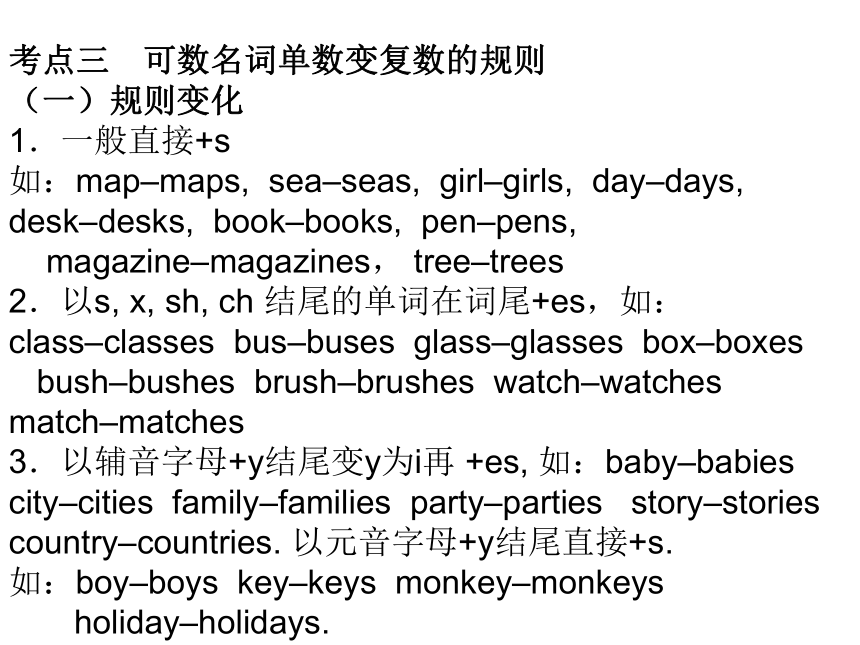
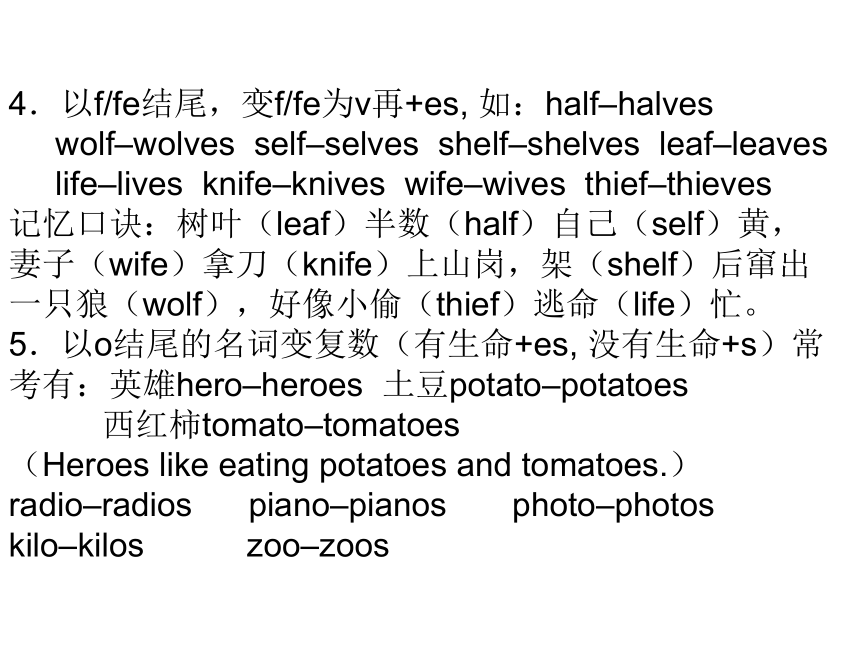
文档简介
课件36张PPT。模块一:语法精讲精练
名词
考点测试
( )1.—Nobody knows which team will win the 2014
World Cup in Brazil.
—Yes. That is the of the beautiful game.
A. question B. luck C. hope D. magic
( )2.—Is the schoolbag under the desk yours?
—No, it’s my ______. He left it there just now.
A. brother B. brother’s C. brothers’
( )3.—After P.E., I often feel very thirsty.
—Why not buy some _______ to drink?
A. bread B. noodles C. apple juice D. teas
CDB( )4.—What a good ____ you’ve given me! Thanks a lot.
—My pleasure.
A. information B. news C. suggestion D. advice
( )5.—It’s convenient to travel from Ezhou to Wuhan by
taking the newly-built green railway.
—Yes. It’s said that _______ is enough.
A. fifteen minutes drive B. fifteen-minutes drive
C. fifteen minute’s drive D. fifteen minutes’ drive
( )6.—Do you come to South Korea for the _______ of
seeing your family or doing business?
—I come here on business.
A. interest B. benefit C. purpose D. thought
( )7._______ the teachers in their school is about 200 and
one fourth of them are _______ teachers.
A. A number of; women B. A number of; woman
C. The number of; women D. The number of; womanCCDC( )8.Could you please get me some _____? I’m hungry.
A. apple B. water C. bread D. egg
( )9.—More and more people come to visit Mount
Huangshan.
—That’s true. It has become the ______ of Anhui.
A. pride B. effort C. praise D. courage
( )10.In this test, we’re asked to write a passage of
about______.
A. 80-words B. 80-word C. 80 words D. 80 words’
( )11.—How far is it from Tianjin to Changsha?
—It is a _______ flight from Tianjin to Changsha.
A. 2-hour-long B. 2-hours-long
C. 2 hours’ long D. 2 hour long
( )12.—When is Day? —It’s on June 1st, Dave.
A. Child B. Children C. Child’s D. Children’s
CADCA( )13.What will global warming(全球变暖) bring us?
Scientists have given us a clear list.
A. news B. dangers C. courses D. advantages
( )14.The park is far away from here indeed it’s about
_______ walk
A. Three hour B. a three hour’s
C. a three-hours D. a three-hour
( )15.Yesterday for dinner I had a piece of beef, vegetables
and ______.
A. some rice B. a few rice C. a little rices D. a rice
( )16.The boy didn’t sleep well last night because of the
______ from the factory.
A. voice B. noise C. music D. songABDB( )17.—The picnic is only in three days. Have you
made any _______?
—Not yet. So let’s discuss what to prepare.
A. wishes B. plans C. mistakes D. friends
( )18.My teacher gave me much _______ on how
to study English well when I had some trouble.
A. advice B. question C. suggestion D. problem
( )19.—Mum, I want to buy an iPhone 5s for a
change.
—Well, I think there is no ____. It’s almost
the same as an iPhone 4s.
A. reason B. need C. answer D. way
( )20.Mr. Black is a teacher of ______. She and
her classmates like him very much.
A. my sister B. my sister’s
C. my sisters D. my sisters’BABB模块一 语法精讲精练 名词考点一 不可数名词(包括物质名词和抽象名词,
不能跟 one, two... 等数词或不定冠词 a, an 连用,
也没有复数形式。)
1.常考的不可数名词:news, music, fun, advice,
weather, information, work, homework, air, time,
money, paper, traffic, practice, progress等。
2.不可数名词的量的表达:
数词+单位/容器(s)+of + 不可数名词。
如:a piece of news (一则新闻)
two bottles of water (两瓶水)
four pieces of advice (四条建议)
six pieces of paper (六张纸)( )1.—I am very thirsty now.
—Would you like some ?
A.tea B.fish C.noodles D.potatoes
( )2.—What can you give me on learning
English?
—I think you could join an English club.
A.advice B.news C.messages D.information
( )3.—Would you like some ?
— Yes, a little please.
A.vegetables B.carrot C.tomato D.meat
( )4.There isn’t any in the fridge .
We need to go shopping.
A.oranges B.milk C.eggs AADB( )5.—Mr. Smith always has to tell us.
— So he does.
A.some good pieces of news
B.some pieces of good news
C.some good piece of news
D.some piece of good news
( )6.—What can I do for you, Madam?
—I’d like .
A.a milk B.a glass of milk C.some milks
( )7.How many _____ can you see ?
A.bottle of oranges B.bottles of orange C.bottles of oranges D.bottle of orange
( )8.—Can I help you,sir? —I’d like to have 100 . I want my students to draw pictures.
A.piece of paper B.pieces of paper C.pieces of papersBBBB考点二 专有名词(指国名、地名、人名、团体、机构、月份、节日的专有名称,第一个字母大写,无复数形式;当以词组的形式表示时,其中的冠词、介词等虚词不用大写。)
如:1.国名、地名、人名、(China;America;Mount Tai 泰山;Mary Smith )
2.组织、团体、机构、报刊(the United Nations联合国;the USA;Beijing University 北京大学; China Daily中国日报;)
3.时间、语言、月份、节日(Sunday;Chinese汉语; April;National Day 国庆节)
( )9. is celebrated on September 10.
A.National Day B.Teachers’ Day
C.Dragon Boat Festival D.Spring Festival
( )10. are going to the USA tomorrow.
A.Smiths B.Smith C.The Smith D.The Smiths( )11.Lincoln was elected of America.
A.President B.a president
C.the president D.president
( )12. is the most important festival in China.
A.Christmas B.Spring Festival
C.Mid–autumn Day D.National DayBDAB考点三 可数名词单数变复数的规则
(一)规则变化
1.一般直接+s
如:map–maps, sea–seas, girl–girls, day–days, desk–desks, book–books, pen–pens,
magazine–magazines, tree–trees
2.以s, x, sh, ch 结尾的单词在词尾+es,如:class–classes bus–buses glass–glasses box–boxes
bush–bushes brush–brushes watch–watches match–matches
3.以辅音字母+y结尾变y为i再 +es, 如:baby–babies city–cities family–families party–parties story–stories country–countries. 以元音字母+y结尾直接+s.
如:boy–boys key–keys monkey–monkeys
holiday–holidays.4.以f/fe结尾,变f/fe为v再+es, 如:half–halves
wolf–wolves self–selves shelf–shelves leaf–leaves
life–lives knife–knives wife–wives thief–thieves
记忆口诀:树叶(leaf)半数(half)自己(self)黄,妻子(wife)拿刀(knife)上山岗,架(shelf)后窜出一只狼(wolf),好像小偷(thief)逃命(life)忙。
5.以o结尾的名词变复数(有生命+es, 没有生命+s)常考有:英雄hero–heroes 土豆potato–potatoes
西红柿tomato–tomatoes
(Heroes like eating potatoes and tomatoes.)
radio–radios piano–pianos photo–photos kilo–kilos zoo–zoos( )13.Yesterday we asked one hundred at
Hilltop School about their New Year’s plans.
A.students B.doctors C.workers
( )14.—Mrs. Zhang was sent to teach English in
a poor mountain village last year.
—She said she would never forget some
pleasant while working there.
A.experiments B.expressions
C.experiences D.emotions
( )15.Cici enjoys dancing. It’s one of her .
A.prize B.prizes C.hobby D.hobbies
( )16.Twelve were hurt, but no were
lost in that accident.
A.person; life B.people; lives
C.peoples; lives D.persons; lifeACDB( )17.Work hard, and you’ll get good .
A.lessons B.notes C.grades D.answers
( )18.Look at the . You can see ,
and in it.
A.photo; potatoes; tomatoes; radioes
B.photoes; potatoes; tomatoes; radios
C.photos; potatoes; tomatoes; radios
D.photoes; potatos; tomatos; radioes
( )19.When autumn comes, of trees turn
yellow .
A.leaf B.leafs C.leaves D.lives
( )20.Titanic went down into the sea. More than 1,500 people lost their .
A.life B.lifes C.lives D.liveCCCC(二)不规则变化
1.不变:两人两动物
(Chinese, Japanese, sheep, deer )
2.多变:小孩和老鼠(child–children, mouse–mice )
3.改 a 为 e : (woman–women, man–men 或者
woman/man构成复合名词,如 policeman–policemen,
postwoman–postwomen, 注意German–Germans,
因为它不是复合名词 )
4.改oo为ee :鹅的牙齿和脚
(goose–geese, tooth–teeth, foot–feet)
( )21.—How many teachers are there in
your school?
— them over two hundred.
A.man; The number of ; is B.men; The number of; is
C.man; A number of ; is D.men; A number of ; are
( )22.There are many playing on the
playground.
A.child B.children C.man teachers D.sheeps
( )23.The that came to the farm
yesterday come here again.
A.deer B.horse C.cow D.dog
( )24.You must brush your every day.
A.tooth B.teeth C.tooths D.teeths BBAB( )25.I saw some and dancing in the street the day before yesterday.
A.Japaneses; Englishman
B.Japanese; Englishmans
C.Japanese; Englishmen
D.Japaneses; Englishmans
(三)由两个名词组成的复合名词常把最后一个名词变成 复数。如:girl students boy friends twin sisters
apple trees shoe shops
但如果前面一个名词是man或woman时,前后两个名词都要变成复数。 如:woman doctor–women doctors
man teacher–men teachers C( )26.There are two in the South Street.
About 12 are working there.
A.books shops; woman workers
B.book shops; women workers
C.books shops; women workers
D.book shops; woman workers
( )27.In Britain are all painted red.
A.letter boxes B.letters boxes
C.letter box D.letters box
( )28.Wang Yaping and Liu Yang are our
in China. We’re proud them.
A.women astronauts; of B.woman astronauts; of
C.women astronauts; inBAA(四)表示民族的单复数常有下列三种变化。如:
1.单复数相同:Chinese–Chinese Japanese–Japanese
2.将man变为men:Englishman–Englishmen
Frenchman–Frenchmen
3.其余全在后面+s:German–Germans
American–Americans Indian–Indians
Australian–Australians Canadian–Canadians
记忆口诀:中日不变英法变,其余s加后面。
( )29.There are three and in the group.
A.Japanese; Germen B.Japaneses; Germans
C.Japan; Germany D.Japanese; GermansD( )30.—Could you please tell me something about
the two ?
— .They are exchange students of
No.1 Middle School.
A.Frenchmen ; Yes, please
B.Frenchmans; Come on
C.Germen; Not at all
D.Germans; All right
(五)有些名词通常只有复数形式。如:
trousers,socks,glasses,clothes,shorts,scissors等;people,police表示复数
(六)有些名词虽然以s结尾却表示单数。如:
news, grass, politics(政治), physics(物理)等。D考点四 既可做可数名词也可做不可数名词:( )31.—Could you please pass me something to
drink?
—What about some ?
A.bread B.orange C.fish D.chicken B( )32.Recently, many people dare not eat
because of H7N9(禽流感).
A.eggs or chickens B.eggs or chicken
C.egg or chickens D.egg or chicken
( )33.—Oh, dear! There isn’t enough
for us in the lift. —No hurry. Let’s wait for the next.
A.floor B.seat C.room D.ground
( )34.Please pick up the .
Don’t keep it on the floor.
A.paper B.boxes C.books D.bottles
( )35.—Are there any in the picture?
—Yes, there are.
A.fish B.pork C.beef BCAA( )36.There is not enough for these things
in these .
A.rooms; rooms B.room; room
C.room; rooms D.rooms; room
( )37.Father bought some .
So we will have some to eat for dinner today.
A.fishes; fishes B.fishs; fish
C.fish; fishes D.fish; fish
( )38.I bought beautiful clothes yesterday.
I like very much.
A.it B.them C.mine D.clothes
( )39.You should do more .
Don’t always sit at the desk busy doing your .
A.exercise; exercises B.exercises; exercise
C.exercises; exercises D.exercise; exerciseCDBA考点五 名词所有格
(表示人或物的隶属和拥有关系,翻译为“……的” 。)
1.s结构(有生命事物的名词以及表示时间、距离、
国家、城市的名词所有格):
1)不与s结尾的名词后+’s。如:Lucy’s father,
Children’s Day, today’s newspaper, the boy’s room .
2)以s结尾的名词后+’。如:the girls’ desks,
Teachers’ Day, the students’ homework
3.两人共同所有:A and B’s。 如Tom and Tim’s room
4.两人各自拥有:A’s and B’s +名词复数。
如 :Tom’s and Tim’s rooms
5.of所有格(表示无生命的名词所有格):
a map of China, the title of the text
6.双重所有格(主要表示整体中的一部分):
of+名词所有格/of +名词性的物主代词
如: a friend of mine, a friend of Jim’s.7.特殊:用介词“to”表达所有格:
the answer to the question 问题的答案;
the key to the door 门的钥匙;
the way to…去….的路;
the solution to the problem 问题的解决方法;
the ticket to the game 比赛的门票。
( )40.—Is your home far from school?
—Not very far. It’s only five walk.
A.minute’s B.minute C.minutes D.minutes’
( )41.In this exam,you’re asked to write a
composition of about .
A.90–words B.90–word C.90 words D.90 word’s
( )42.My skirt is on the chair.
A.sisters’ B.sister C.sisters D.sister’sDCD( )43.Tom’s watch is the same as his .
A.brother B.brothers C.brother’s
( )44.Looking after children is not only
work, men should also do it.
A.woman’s B.women C.womens’ D.women’s
( )45.Miss Green is a friend of .
A.Mary’s mother’s B.Mary’s mother
C.Mary mother’s D.mother’s of Mary
( )46.The theme park is about ride
from the museum. You should start out right now.
A.two hour B.two hour’s C.two hours’ D.two hours
( )47. mothers couldn’t go to the meeting,
because they have gone to Chengdu.
A.Li Lei and Lucy’s B.Li Lei’s and Lucy’s
C.Li Lei and Lucy D.Li Lei’s and LucyCDACB( )1.—It’s really hot today. What drinks do we
have in the fridge?
—We have some . (2009广东)
A.noodle B.cheese C.sausages D.lemonade
( )2.Look! The kites in the sky are in different .
Some are big and some are small.(2010 广东)
A.size B.sizes C.colour D.colours
( )3.—I hear you run for half an hour every day.
—Right, we have to. It is one of the in
our school.(2011 广东)
A.rules B.plans C.hobbies D.choices
( )4.The students of Grade 7 visited Mike’s farm
and saw many there.(2012 广东)
A.bird B.duck C.sheep D.rabbitDBAC( )5.—Mum, I’ve heard that we can’t eat these
days. Is it true? (2013 广东)
—Take it easy. It is safe to eat cooked meat. A.chicken B.chickens
C.a chicken D.the chicken
( )6.Katherine was excited to receive a dozen of roses from her husband on Day.(2014 广东)
A.Woman B.Women C.Woman’s D.Women’sAD( )1.Their were more expensive than ours.
A.radio B.radioes C.radios D.photoes
( )2.The parents bought two for the twin
brothers as birthday presents.
A.watchs B.a watch C.watch D.watches
( )3.There are a lot of on the hill but
hardly any .
A.sheep; people B.cows; person
C.sheeps; peoples D.cows; peoples
( )4.There are lots of in the basket on
the table.
A.tomato B.tomatos C.tomatoes D.potatos CDAC( )5.It is an English to have afternoon tea.
A.menu B.drink C.festival D.tradition
( )6.—Can he speak Chinese?
—Yes, . He has been in China for a year.
A.many B.a little C.little D.a few
( )7.—Whose shirt is this? —It’s .
A.Meimei B.Meimei’s C.Meimeis’ D.of Meimei
( )8.The are going to fly to Shanghai
for their holiday.
A.German B.Germany C.Germen D.Germans
( )9.—Can I help you?
—I’d like to have .
A.two breads B.two pieces of bread
C.two pieces of breads D.two piece of breadDBBDB( )10. fathers both work in the same factory.
A.Dick and John B.Dick and John’s
C.Dick’s and John’s D.Dick’s and John
( )11.Please give me three .I want to
write something on them.
A.big pieces of papers B.big pieces of paper
C.papers D.paper
( )12.There are two in the boy’s hand.
Ask him to put them down. It’s dangerous.
A.knife B.Knives C.knifes D.pieces of knives
( )13.He’s left a , saying that he has
some important things to do.
A.sentence B.excuse C.news D.message
( )14.—Mom, where is peter?
—He has gone to .
A.Dave B.Dave’s C.Dave home D.the Dave houseCBBDB( )15.How water is there in the bottle?
A.many B.much C.any D.soon
( )16.I’m going to buy .
A.a trousers B. a pair of trouser
C.a pair of trousers D.two pair of trousers
( )17.Many came to visit Beijing in 2008.
A.foreign B.foreigner
C.foreigners D.the foreigners
( )18.The people over there are .
They are not .
A.Germans; Frenchmen B.Germans; Frenchman
C.Germen; Frenchmen D.Germany; France
( )19.Don’t worry. There is left.
A.some times B.many time
C.much time D.any time BCCA C ( )20.All the women teachers enjoyed themselves
on , because it was their own holiday.
A.May 8th B.January 8th C.June 8th D.March 8th
( )21.—I’ve got a little in my house.
—Why not keep two or more?
A.juice B.mice C.fish D.room
( )22.Brian is so kind that he often gives me
a when I’m in trouble.
A.reply B.seat C.hand D.head
( )23.My brother hurt his yesterday.
He can’t walk now .
A.arm B.leg C.hand D.mouth
( )24.—What sign is often found in museums?
—“ .”
A.MENU B.THIS SIDE UP
C.NO PHOTOS D.NO PARKINGDCCBC( )25.There is good for you. I’ve found
your lost watch.
A.advice B.ideas C.messages D.news
( )26.We bought for my mother’s birthday.
A.some meats B.some piece of meat
C.a piece of meat D.a meat
( )27.—Whose new desk is this ? —It’s .
A.Sue and Jim’s B.Sue and Jim
C.Sue’s and Jim’s D.Sue’s and Jim
( )28.—Would you like coffee?
—No, thanks. I’ve drunk two .
A.any; bottles of orange B.little; bottle of oranges
C.some; bottles of orange D.some; bottles of orangesDCAC( )29.—How many do you want ?
—Two, please.
A.kilos of egg B.kilo of eggs
C.kilos of eggs D.kilo of egg
( )30.The railway station is two
from our house.
A.hour’s drive B.hour drive
C.hour drive D.hours’ drive
( )31.—Where are you going, Lucy?
— .
A.To my uncle B.To my uncle’s
C.At my uncle’s D.From my uncle’s
( )32.There are a lot of doctors there, but hardly
any .
A.Policemen B.peoples C.policemans D.personCDBA( )33.Mr Lin often gives us by email.
A.some good information B.some good food
C.any good information D.any good food
( )34.—Help yourself to some .
—Thank you .I really like them.
A.fish B.orange C.cakes D.bread
( )35.Yesterday a few came to visit
some in Beijing.
A.Germans; places of interests
B.Germen; places of interest
C.German; places of interest
D.Germans; places of interestACD
名词
考点测试
( )1.—Nobody knows which team will win the 2014
World Cup in Brazil.
—Yes. That is the of the beautiful game.
A. question B. luck C. hope D. magic
( )2.—Is the schoolbag under the desk yours?
—No, it’s my ______. He left it there just now.
A. brother B. brother’s C. brothers’
( )3.—After P.E., I often feel very thirsty.
—Why not buy some _______ to drink?
A. bread B. noodles C. apple juice D. teas
CDB( )4.—What a good ____ you’ve given me! Thanks a lot.
—My pleasure.
A. information B. news C. suggestion D. advice
( )5.—It’s convenient to travel from Ezhou to Wuhan by
taking the newly-built green railway.
—Yes. It’s said that _______ is enough.
A. fifteen minutes drive B. fifteen-minutes drive
C. fifteen minute’s drive D. fifteen minutes’ drive
( )6.—Do you come to South Korea for the _______ of
seeing your family or doing business?
—I come here on business.
A. interest B. benefit C. purpose D. thought
( )7._______ the teachers in their school is about 200 and
one fourth of them are _______ teachers.
A. A number of; women B. A number of; woman
C. The number of; women D. The number of; womanCCDC( )8.Could you please get me some _____? I’m hungry.
A. apple B. water C. bread D. egg
( )9.—More and more people come to visit Mount
Huangshan.
—That’s true. It has become the ______ of Anhui.
A. pride B. effort C. praise D. courage
( )10.In this test, we’re asked to write a passage of
about______.
A. 80-words B. 80-word C. 80 words D. 80 words’
( )11.—How far is it from Tianjin to Changsha?
—It is a _______ flight from Tianjin to Changsha.
A. 2-hour-long B. 2-hours-long
C. 2 hours’ long D. 2 hour long
( )12.—When is Day? —It’s on June 1st, Dave.
A. Child B. Children C. Child’s D. Children’s
CADCA( )13.What will global warming(全球变暖) bring us?
Scientists have given us a clear list.
A. news B. dangers C. courses D. advantages
( )14.The park is far away from here indeed it’s about
_______ walk
A. Three hour B. a three hour’s
C. a three-hours D. a three-hour
( )15.Yesterday for dinner I had a piece of beef, vegetables
and ______.
A. some rice B. a few rice C. a little rices D. a rice
( )16.The boy didn’t sleep well last night because of the
______ from the factory.
A. voice B. noise C. music D. songABDB( )17.—The picnic is only in three days. Have you
made any _______?
—Not yet. So let’s discuss what to prepare.
A. wishes B. plans C. mistakes D. friends
( )18.My teacher gave me much _______ on how
to study English well when I had some trouble.
A. advice B. question C. suggestion D. problem
( )19.—Mum, I want to buy an iPhone 5s for a
change.
—Well, I think there is no ____. It’s almost
the same as an iPhone 4s.
A. reason B. need C. answer D. way
( )20.Mr. Black is a teacher of ______. She and
her classmates like him very much.
A. my sister B. my sister’s
C. my sisters D. my sisters’BABB模块一 语法精讲精练 名词考点一 不可数名词(包括物质名词和抽象名词,
不能跟 one, two... 等数词或不定冠词 a, an 连用,
也没有复数形式。)
1.常考的不可数名词:news, music, fun, advice,
weather, information, work, homework, air, time,
money, paper, traffic, practice, progress等。
2.不可数名词的量的表达:
数词+单位/容器(s)+of + 不可数名词。
如:a piece of news (一则新闻)
two bottles of water (两瓶水)
four pieces of advice (四条建议)
six pieces of paper (六张纸)( )1.—I am very thirsty now.
—Would you like some ?
A.tea B.fish C.noodles D.potatoes
( )2.—What can you give me on learning
English?
—I think you could join an English club.
A.advice B.news C.messages D.information
( )3.—Would you like some ?
— Yes, a little please.
A.vegetables B.carrot C.tomato D.meat
( )4.There isn’t any in the fridge .
We need to go shopping.
A.oranges B.milk C.eggs AADB( )5.—Mr. Smith always has to tell us.
— So he does.
A.some good pieces of news
B.some pieces of good news
C.some good piece of news
D.some piece of good news
( )6.—What can I do for you, Madam?
—I’d like .
A.a milk B.a glass of milk C.some milks
( )7.How many _____ can you see ?
A.bottle of oranges B.bottles of orange C.bottles of oranges D.bottle of orange
( )8.—Can I help you,sir? —I’d like to have 100 . I want my students to draw pictures.
A.piece of paper B.pieces of paper C.pieces of papersBBBB考点二 专有名词(指国名、地名、人名、团体、机构、月份、节日的专有名称,第一个字母大写,无复数形式;当以词组的形式表示时,其中的冠词、介词等虚词不用大写。)
如:1.国名、地名、人名、(China;America;Mount Tai 泰山;Mary Smith )
2.组织、团体、机构、报刊(the United Nations联合国;the USA;Beijing University 北京大学; China Daily中国日报;)
3.时间、语言、月份、节日(Sunday;Chinese汉语; April;National Day 国庆节)
( )9. is celebrated on September 10.
A.National Day B.Teachers’ Day
C.Dragon Boat Festival D.Spring Festival
( )10. are going to the USA tomorrow.
A.Smiths B.Smith C.The Smith D.The Smiths( )11.Lincoln was elected of America.
A.President B.a president
C.the president D.president
( )12. is the most important festival in China.
A.Christmas B.Spring Festival
C.Mid–autumn Day D.National DayBDAB考点三 可数名词单数变复数的规则
(一)规则变化
1.一般直接+s
如:map–maps, sea–seas, girl–girls, day–days, desk–desks, book–books, pen–pens,
magazine–magazines, tree–trees
2.以s, x, sh, ch 结尾的单词在词尾+es,如:class–classes bus–buses glass–glasses box–boxes
bush–bushes brush–brushes watch–watches match–matches
3.以辅音字母+y结尾变y为i再 +es, 如:baby–babies city–cities family–families party–parties story–stories country–countries. 以元音字母+y结尾直接+s.
如:boy–boys key–keys monkey–monkeys
holiday–holidays.4.以f/fe结尾,变f/fe为v再+es, 如:half–halves
wolf–wolves self–selves shelf–shelves leaf–leaves
life–lives knife–knives wife–wives thief–thieves
记忆口诀:树叶(leaf)半数(half)自己(self)黄,妻子(wife)拿刀(knife)上山岗,架(shelf)后窜出一只狼(wolf),好像小偷(thief)逃命(life)忙。
5.以o结尾的名词变复数(有生命+es, 没有生命+s)常考有:英雄hero–heroes 土豆potato–potatoes
西红柿tomato–tomatoes
(Heroes like eating potatoes and tomatoes.)
radio–radios piano–pianos photo–photos kilo–kilos zoo–zoos( )13.Yesterday we asked one hundred at
Hilltop School about their New Year’s plans.
A.students B.doctors C.workers
( )14.—Mrs. Zhang was sent to teach English in
a poor mountain village last year.
—She said she would never forget some
pleasant while working there.
A.experiments B.expressions
C.experiences D.emotions
( )15.Cici enjoys dancing. It’s one of her .
A.prize B.prizes C.hobby D.hobbies
( )16.Twelve were hurt, but no were
lost in that accident.
A.person; life B.people; lives
C.peoples; lives D.persons; lifeACDB( )17.Work hard, and you’ll get good .
A.lessons B.notes C.grades D.answers
( )18.Look at the . You can see ,
and in it.
A.photo; potatoes; tomatoes; radioes
B.photoes; potatoes; tomatoes; radios
C.photos; potatoes; tomatoes; radios
D.photoes; potatos; tomatos; radioes
( )19.When autumn comes, of trees turn
yellow .
A.leaf B.leafs C.leaves D.lives
( )20.Titanic went down into the sea. More than 1,500 people lost their .
A.life B.lifes C.lives D.liveCCCC(二)不规则变化
1.不变:两人两动物
(Chinese, Japanese, sheep, deer )
2.多变:小孩和老鼠(child–children, mouse–mice )
3.改 a 为 e : (woman–women, man–men 或者
woman/man构成复合名词,如 policeman–policemen,
postwoman–postwomen, 注意German–Germans,
因为它不是复合名词 )
4.改oo为ee :鹅的牙齿和脚
(goose–geese, tooth–teeth, foot–feet)
( )21.—How many teachers are there in
your school?
— them over two hundred.
A.man; The number of ; is B.men; The number of; is
C.man; A number of ; is D.men; A number of ; are
( )22.There are many playing on the
playground.
A.child B.children C.man teachers D.sheeps
( )23.The that came to the farm
yesterday come here again.
A.deer B.horse C.cow D.dog
( )24.You must brush your every day.
A.tooth B.teeth C.tooths D.teeths BBAB( )25.I saw some and dancing in the street the day before yesterday.
A.Japaneses; Englishman
B.Japanese; Englishmans
C.Japanese; Englishmen
D.Japaneses; Englishmans
(三)由两个名词组成的复合名词常把最后一个名词变成 复数。如:girl students boy friends twin sisters
apple trees shoe shops
但如果前面一个名词是man或woman时,前后两个名词都要变成复数。 如:woman doctor–women doctors
man teacher–men teachers C( )26.There are two in the South Street.
About 12 are working there.
A.books shops; woman workers
B.book shops; women workers
C.books shops; women workers
D.book shops; woman workers
( )27.In Britain are all painted red.
A.letter boxes B.letters boxes
C.letter box D.letters box
( )28.Wang Yaping and Liu Yang are our
in China. We’re proud them.
A.women astronauts; of B.woman astronauts; of
C.women astronauts; inBAA(四)表示民族的单复数常有下列三种变化。如:
1.单复数相同:Chinese–Chinese Japanese–Japanese
2.将man变为men:Englishman–Englishmen
Frenchman–Frenchmen
3.其余全在后面+s:German–Germans
American–Americans Indian–Indians
Australian–Australians Canadian–Canadians
记忆口诀:中日不变英法变,其余s加后面。
( )29.There are three and in the group.
A.Japanese; Germen B.Japaneses; Germans
C.Japan; Germany D.Japanese; GermansD( )30.—Could you please tell me something about
the two ?
— .They are exchange students of
No.1 Middle School.
A.Frenchmen ; Yes, please
B.Frenchmans; Come on
C.Germen; Not at all
D.Germans; All right
(五)有些名词通常只有复数形式。如:
trousers,socks,glasses,clothes,shorts,scissors等;people,police表示复数
(六)有些名词虽然以s结尾却表示单数。如:
news, grass, politics(政治), physics(物理)等。D考点四 既可做可数名词也可做不可数名词:( )31.—Could you please pass me something to
drink?
—What about some ?
A.bread B.orange C.fish D.chicken B( )32.Recently, many people dare not eat
because of H7N9(禽流感).
A.eggs or chickens B.eggs or chicken
C.egg or chickens D.egg or chicken
( )33.—Oh, dear! There isn’t enough
for us in the lift. —No hurry. Let’s wait for the next.
A.floor B.seat C.room D.ground
( )34.Please pick up the .
Don’t keep it on the floor.
A.paper B.boxes C.books D.bottles
( )35.—Are there any in the picture?
—Yes, there are.
A.fish B.pork C.beef BCAA( )36.There is not enough for these things
in these .
A.rooms; rooms B.room; room
C.room; rooms D.rooms; room
( )37.Father bought some .
So we will have some to eat for dinner today.
A.fishes; fishes B.fishs; fish
C.fish; fishes D.fish; fish
( )38.I bought beautiful clothes yesterday.
I like very much.
A.it B.them C.mine D.clothes
( )39.You should do more .
Don’t always sit at the desk busy doing your .
A.exercise; exercises B.exercises; exercise
C.exercises; exercises D.exercise; exerciseCDBA考点五 名词所有格
(表示人或物的隶属和拥有关系,翻译为“……的” 。)
1.s结构(有生命事物的名词以及表示时间、距离、
国家、城市的名词所有格):
1)不与s结尾的名词后+’s。如:Lucy’s father,
Children’s Day, today’s newspaper, the boy’s room .
2)以s结尾的名词后+’。如:the girls’ desks,
Teachers’ Day, the students’ homework
3.两人共同所有:A and B’s。 如Tom and Tim’s room
4.两人各自拥有:A’s and B’s +名词复数。
如 :Tom’s and Tim’s rooms
5.of所有格(表示无生命的名词所有格):
a map of China, the title of the text
6.双重所有格(主要表示整体中的一部分):
of+名词所有格/of +名词性的物主代词
如: a friend of mine, a friend of Jim’s.7.特殊:用介词“to”表达所有格:
the answer to the question 问题的答案;
the key to the door 门的钥匙;
the way to…去….的路;
the solution to the problem 问题的解决方法;
the ticket to the game 比赛的门票。
( )40.—Is your home far from school?
—Not very far. It’s only five walk.
A.minute’s B.minute C.minutes D.minutes’
( )41.In this exam,you’re asked to write a
composition of about .
A.90–words B.90–word C.90 words D.90 word’s
( )42.My skirt is on the chair.
A.sisters’ B.sister C.sisters D.sister’sDCD( )43.Tom’s watch is the same as his .
A.brother B.brothers C.brother’s
( )44.Looking after children is not only
work, men should also do it.
A.woman’s B.women C.womens’ D.women’s
( )45.Miss Green is a friend of .
A.Mary’s mother’s B.Mary’s mother
C.Mary mother’s D.mother’s of Mary
( )46.The theme park is about ride
from the museum. You should start out right now.
A.two hour B.two hour’s C.two hours’ D.two hours
( )47. mothers couldn’t go to the meeting,
because they have gone to Chengdu.
A.Li Lei and Lucy’s B.Li Lei’s and Lucy’s
C.Li Lei and Lucy D.Li Lei’s and LucyCDACB( )1.—It’s really hot today. What drinks do we
have in the fridge?
—We have some . (2009广东)
A.noodle B.cheese C.sausages D.lemonade
( )2.Look! The kites in the sky are in different .
Some are big and some are small.(2010 广东)
A.size B.sizes C.colour D.colours
( )3.—I hear you run for half an hour every day.
—Right, we have to. It is one of the in
our school.(2011 广东)
A.rules B.plans C.hobbies D.choices
( )4.The students of Grade 7 visited Mike’s farm
and saw many there.(2012 广东)
A.bird B.duck C.sheep D.rabbitDBAC( )5.—Mum, I’ve heard that we can’t eat these
days. Is it true? (2013 广东)
—Take it easy. It is safe to eat cooked meat. A.chicken B.chickens
C.a chicken D.the chicken
( )6.Katherine was excited to receive a dozen of roses from her husband on Day.(2014 广东)
A.Woman B.Women C.Woman’s D.Women’sAD( )1.Their were more expensive than ours.
A.radio B.radioes C.radios D.photoes
( )2.The parents bought two for the twin
brothers as birthday presents.
A.watchs B.a watch C.watch D.watches
( )3.There are a lot of on the hill but
hardly any .
A.sheep; people B.cows; person
C.sheeps; peoples D.cows; peoples
( )4.There are lots of in the basket on
the table.
A.tomato B.tomatos C.tomatoes D.potatos CDAC( )5.It is an English to have afternoon tea.
A.menu B.drink C.festival D.tradition
( )6.—Can he speak Chinese?
—Yes, . He has been in China for a year.
A.many B.a little C.little D.a few
( )7.—Whose shirt is this? —It’s .
A.Meimei B.Meimei’s C.Meimeis’ D.of Meimei
( )8.The are going to fly to Shanghai
for their holiday.
A.German B.Germany C.Germen D.Germans
( )9.—Can I help you?
—I’d like to have .
A.two breads B.two pieces of bread
C.two pieces of breads D.two piece of breadDBBDB( )10. fathers both work in the same factory.
A.Dick and John B.Dick and John’s
C.Dick’s and John’s D.Dick’s and John
( )11.Please give me three .I want to
write something on them.
A.big pieces of papers B.big pieces of paper
C.papers D.paper
( )12.There are two in the boy’s hand.
Ask him to put them down. It’s dangerous.
A.knife B.Knives C.knifes D.pieces of knives
( )13.He’s left a , saying that he has
some important things to do.
A.sentence B.excuse C.news D.message
( )14.—Mom, where is peter?
—He has gone to .
A.Dave B.Dave’s C.Dave home D.the Dave houseCBBDB( )15.How water is there in the bottle?
A.many B.much C.any D.soon
( )16.I’m going to buy .
A.a trousers B. a pair of trouser
C.a pair of trousers D.two pair of trousers
( )17.Many came to visit Beijing in 2008.
A.foreign B.foreigner
C.foreigners D.the foreigners
( )18.The people over there are .
They are not .
A.Germans; Frenchmen B.Germans; Frenchman
C.Germen; Frenchmen D.Germany; France
( )19.Don’t worry. There is left.
A.some times B.many time
C.much time D.any time BCCA C ( )20.All the women teachers enjoyed themselves
on , because it was their own holiday.
A.May 8th B.January 8th C.June 8th D.March 8th
( )21.—I’ve got a little in my house.
—Why not keep two or more?
A.juice B.mice C.fish D.room
( )22.Brian is so kind that he often gives me
a when I’m in trouble.
A.reply B.seat C.hand D.head
( )23.My brother hurt his yesterday.
He can’t walk now .
A.arm B.leg C.hand D.mouth
( )24.—What sign is often found in museums?
—“ .”
A.MENU B.THIS SIDE UP
C.NO PHOTOS D.NO PARKINGDCCBC( )25.There is good for you. I’ve found
your lost watch.
A.advice B.ideas C.messages D.news
( )26.We bought for my mother’s birthday.
A.some meats B.some piece of meat
C.a piece of meat D.a meat
( )27.—Whose new desk is this ? —It’s .
A.Sue and Jim’s B.Sue and Jim
C.Sue’s and Jim’s D.Sue’s and Jim
( )28.—Would you like coffee?
—No, thanks. I’ve drunk two .
A.any; bottles of orange B.little; bottle of oranges
C.some; bottles of orange D.some; bottles of orangesDCAC( )29.—How many do you want ?
—Two, please.
A.kilos of egg B.kilo of eggs
C.kilos of eggs D.kilo of egg
( )30.The railway station is two
from our house.
A.hour’s drive B.hour drive
C.hour drive D.hours’ drive
( )31.—Where are you going, Lucy?
— .
A.To my uncle B.To my uncle’s
C.At my uncle’s D.From my uncle’s
( )32.There are a lot of doctors there, but hardly
any .
A.Policemen B.peoples C.policemans D.personCDBA( )33.Mr Lin often gives us by email.
A.some good information B.some good food
C.any good information D.any good food
( )34.—Help yourself to some .
—Thank you .I really like them.
A.fish B.orange C.cakes D.bread
( )35.Yesterday a few came to visit
some in Beijing.
A.Germans; places of interests
B.Germen; places of interest
C.German; places of interest
D.Germans; places of interestACD
同课章节目录
- 词法
- 名词
- 动词和动词短语
- 动词语态
- 动词时态
- 助动词和情态动词
- 非谓语动词
- 冠词
- 代词
- 数词和量词
- 形容词副词及其比较等级
- 介词和介词短语
- 连词和感叹词
- 构词法
- 相似、相近词比较
- 句法
- 陈述句
- 一般疑问句和否定疑问句
- 特殊疑问句及选择疑问句
- 反意疑问句
- 存在句(There be句型)
- 宾语从句
- 定语从句
- 状语从句
- 主谓一致问题
- 简单句
- 并列句
- 复合句
- 主谓一致
- 主、表语从句
- 名词性从句
- 直接引语和间接引语
- 虚拟语气
- 感叹句
- 强调句
- 倒装句
- 祈使句
- 句子的成分
- 句子的分类
- 题型专区
- 单项选择部分
- 易错题
- 完形填空
- 阅读理解
- 词汇练习
- 听说训练
- 句型转换
- 补全对话
- 短文改错
- 翻译
- 书面表达
- 任务型阅读
- 语法填空
- 其他资料
